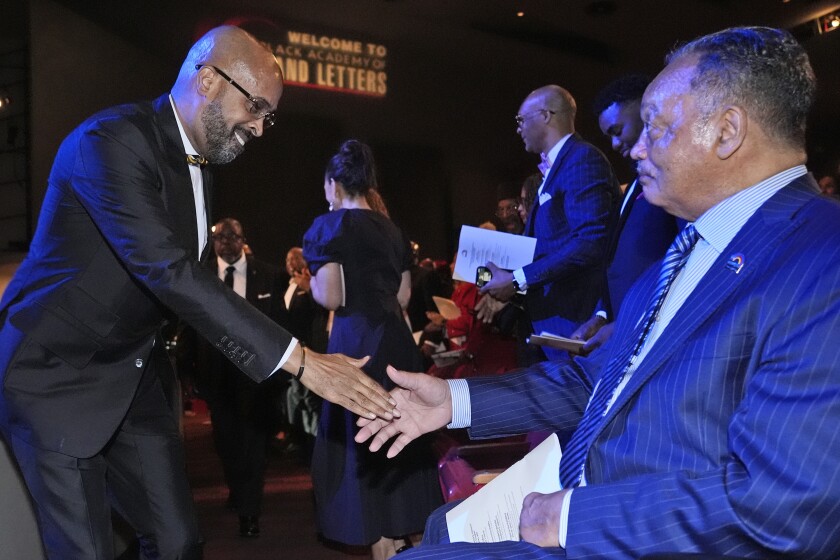“While I respect the intellectualism and intent of Michael Eric Dyson, and treasure our friendship,” the Rev. Jesse Jackson wrote on Aug. 9, 2006, “his attacks on Bill Cosby are too harsh.” Jackson was responding to my book criticizing Cosby’s vicious assaults on poor Blacks in his infamous 2004 “pound cake” speech. Allow me to return the favor to my dear friend of nearly 35 years.
When the Rev. Dr. Frederick Douglass Haynes III announced his sudden resignation as head of the Jackson-conceived Rainbow PUSH Coalition after only three months at the helm, Jackson acolytes and defenders dismissed Haynes’ skills and dedication and subtly implied he wasn’t up to the job. Such jabs are not only harsh but unprincipled. Renowned political strategist Delmarie Cobb suggested that Jackson, despite failing health, remained on a mission and implied that Haynes lacked the commitment to make it a go. Yet PUSH picked Haynes because his passion for social justice might help the group soar again.
The issue is not that Haynes isn’t an eagle; the problem is, too many around Jackson expected Haynes to be a parrot.
When Haynes agreed to take on the leadership of PUSH, it was, and remains, in financial shambles. The shoestring budgets and by-the-seat-of-your-pants fundraising were the byproduct of an organization whose greatest achievements were long behind it. The halcyon days of PUSH could be measured in the style of Jackson’s mane and in his sartorial fare. In the ‘70s, there was Jackson’s flamboyant ‘fro and the medallions and dashikis he sported as he preached Black pride. In the ‘80s and early ‘90s, Jackson trimmed his locks, ran for the Oval Office and crossed the brook of racial fire to keep hope alive while donning Brooks Brothers suits.
In these periods of relative prosperity, the cash flow was far more generous, matching the stream of inspiring rhetoric that poured from his mustache-traced lips. But times changed, seasons shifted, and Jackson’s epic marathon was marred by occasional missteps, like wishing to sever then-presidential candidate Barack Obama’s manhood in 2008.
To seemingly blame Haynes for these seismic shifts in the tectonic plates of culture and finance is, quite frankly, ridiculous. The man had little to go on, and even if he had decamped from Dallas and pitched his tent at PUSH, the frayed coalition may never have become flush again because the drought has dried up so many reserves.
A ‘cult of personality’ at PUSH
Then, too, there was the concomitant emergence of an unlikely leader out of Brooklyn. The Rev. Al Sharpton and his National Action Network scooped up the corporate capital, political legitimacy, celebrity endorsements and donor dollars of the disempowered, leaving little resources for PUSH and his mentor Jackson. Haynes could hardly pull PUSH from the financial doldrums and reputational quicksand in which it sank.
Haynes faced a perhaps more daunting task: succeeding a man who many didn’t want succeeded, making it impossible for Haynes to succeed. The cult of personality attached to charismatic leaders is not unfamiliar in Black America. From Marcus Garvey to Malcolm X, from Elijah Muhammad to Martin Luther King Jr., we have known the incredible heights scaled by great men, even as we have witnessed the perils of hyping their persona above the organizations and institutions they build, inherit and leave behind.
Like Jackson, Haynes cuts a phenomenal figure. Like Jackson, who at his height was as gorgeous as the actor Boris Kodjoe, except decked out with a hirsute halo, Haynes is a virile, clean-pated, honeyed slice of ebony masculinity, a tall tower of rhetorical genius whose weeklong revival services in cities across America draw thousands to church to hear him declare the Word. He is a prophetic pulpiteer, the pastor of a megachurch and a homiletical master who rigorously employs the Gospel to preach social justice, to lead protests and to testify before Congress.
To characterize Haynes, as Jackson admiringly did, as a “fantastic preacher,” is but half the truth. As the pastor of a church with more than 12,000 members, Haynes is doing something Jackson never desired or achieved: He faithfully serves parishioners who hold him to account in a democratic process often missing in some of our organizations. In that way, Haynes is more akin to King than Jackson: They both managed pastoral duties while pushing for social justice.
The hard truth is many around Jackson don’t want him to relinquish power, even to a figure like Haynes, who to this day adores Jackson and has not a bad word to say about him. The succession of men who have paraded through PUSH as would-be successors to Jackson testifies to the inability to surrender authority for the good of the group.
Without a sense of irony, Jackson’s defenders lay out the qualifications to fill Jackson’s shoes. They miss the most salient one: for Jackson to step aside in grace and class to allow a successor to craft a plan of revival for the group while showing respect to the founder, and for the cavalcade of Jackson sycophants to stop showering down chaos so the rainbow can once again shine.
Michael Eric Dyson is an academic, author and ordained minister. He is professor of African American and diaspora studies at Vanderbilt University and a professor of ethics and society at Vanderbilt Divinity School.
Send letters to letters@suntimes.com





